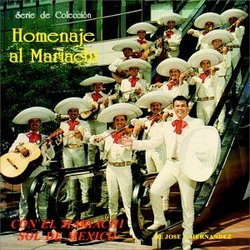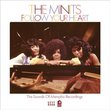| All Artists: Mariachi Sol De Mexico Title: Homenaje Al Mariachi Members Wishing: 0 Total Copies: 0 Label: EMI Latin Release Date: 4/19/1994 Genres: International Music, Latin Music Styles: Mexico, Regional Mexican, Mariachi Number of Discs: 1 SwapaCD Credits: 1 UPCs: 724382902126, 724382902140 |
Search - Mariachi Sol De Mexico :: Homenaje Al Mariachi
 | Mariachi Sol De Mexico Homenaje Al Mariachi Genres: International Music, Latin Music
|
Larger Image |
CD DetailsSimilar CDs
|
CD ReviewsHistorical Mariachi Enrique Torres | San Diegotitlan, Califas | 06/11/2000 (5 out of 5 stars) "This is a superb collecion and project that begins with a narration documenting the origins of the Mariachi while Mariachi music plays in the background. Jose Hernandez's Mariachi group does a superb job trying to replicate the authenticity of early Mariachi music. They go as far as to record in monoral to replicate the early era and roots of the Mariachi. The history lesson continues throughout the first part of the CD and is very informative. The second part allows the band to show their stuff and they give a glimpse into where the creative energies may be going. The vehicle is the Mariachi but the tradicion is changing as Hernandez'z group demonstrates. There are homenajes(homages) paid to Jose Alfredo Jimenez and a popurri of songs that are classic. There are a nice series of huapangoes that really are superb. This is a fantastic CD that informs as well as gives you some of the best Mexican music ever, El Mariachi! The CD ends with Jose giving lessons to some youngsters, passing the tradional music on another generation, insuring that Mariachi music will live on as one of the great cultural reflections of Mexicans on both sides of the border. Any serious collector or lover of Mariachi should have this in their collection so don't hesitate to add this now, you'll learn something and you won't be disappointed." Very good history Raymond E. Rojas | El Paso, Texas | 09/04/2005 (4 out of 5 stars) "I have to praise Sol de Mexico for putting out this album. It really gives a good history of Mariachi in a few minutes. The narrative history you hear was written by Laura Sobrino and Jonathan Clark.
Here, Sol de Mexico mimics the old style of playing sones "Camino Real de Colima," "La Mariquita," "La Venadita," "El Riflero," and "El Calero." For the latter three, they have not been recorded much since the 1940s and 50s. The liner notes say Jose Hernandez father Esteban Hernandez helped out on those old sones and how to play them. Listen to the vocal style and the solo violin in "Camino." The violin player does very well. As the other violins join in "El Riflero," this shows Sol de Mexico can play a son jalisiense well if they really wanted to. Even in "El Venadito" the trumpets are superb in playing sones as trumpets players should. Also includes in this is a version of "El Chuparrosa." I really wish Jose Hernandez would do a full recording of this song by Miguel Martinez. Mariachi Cobre has already done it, but I imagine a good trumpet player like Hernandez can knock this one out with ease. And if he adds his brother Chencho as a guest trumpeter, the better. The "Cocula" arrangment you hears is not very good, but the "Bikina" arrangement saves it. I think Sol de Mexico did an earlier recording of "La Bikina" (if not the same one). "Soy la voz" sounds like some of the recordings Mariachi Vargas de Tecalitlan did in the late 70s. It recalls "El Pajarillo" from Vargas' "El Mejor del Mundo" album of 1976. I'm not a great fan of either song, but why stay in the norm. Popurri Viva Espana is a good popurri. I like the flamenco guitar they add as well as the bull fighter's intro. Sol de Mexico has always had good trumpet players, so this popurri is pulled off well. I kind of grew tired of the many "Las Bodas de Luis Alonso" recordings that flurished in the 1980s and 1990s. Here, I don't like the transition into "Bodas", but the strings do well. I'm imagine the trumpet solos are by Jose Hernandez, who does well. I'm not sure if I here soem flugal horn in this arrangement too. "Espani Cani" is also performed with good grace. The strings play well together and are powerful. I think la "Virgen de la Macarena" is added here. The solo trumpets are execellent. The popurri jumps back into "Bodas" on a good tone high note by the solo trumpet player. There is some intonation in the violins as they climb the scale. The trumpets follow. I've seen better runs as this by other trumpets. Chencho Hernandez when he was with Los Camperos comes to mind. The second run of the trumpets is much better. I'm not too much of fan of "Huapango Alegre" so I'll skip it. "El Aguacero" could have used a shorter intro. The intro has its goods and bads. They singer is very good. A lot of passion. Some of the adornos are too much, but one thing about Sol de Mexico is they are hardly ever out of tune. I didn't like the ending. "Popurri Cielo Rojo" is where this album get's real good. Pedro Rey sings on this and as you may know, he's a phenominal singer. I think some of these song are done with orchestra and meant to be arrangements for orchestra. There are alot of chimes, flutes, and other of the like. "Popurri El Sueno" is very good, execept for the intro. However, the harp player plays the "Jarabe Loco" into well and like the adornos in the background as well as "La Noche y tu." The transition to "El Sueno" is done well. I think the adornos are over done though, but listen to the harmonies of the singers. They are executed well, as well as the falsettos. Not Miguel Aceves Mejia or Mario Santiago, but done well. The popurri jumps back into "La Noche y tu" with good harmonies by the chorus. I'm not a fan of the ending. "Vamanos" has Pedro Rey singing again. The arpa on "Ella" sounds very nostalgic as well as the intro by the narrator. What I don't like is the "Ella" "me canse de rogarle" into into "Vamanos." Jose Hernandez sings this with Pedro Rey. The brothers sound very good together. I think its the last verse, the violins and arpa are superb. I think they should of ended with "Vamanos" instead of adding "Que Bonito Amor." I'm wishy washing on that ending. The CD ends with a nice rendition by Hernandez' children. In general, the CD is very good. I base these notes on a Capricho recording." |

 Track Listings (14) - Disc #1
Track Listings (14) - Disc #1

